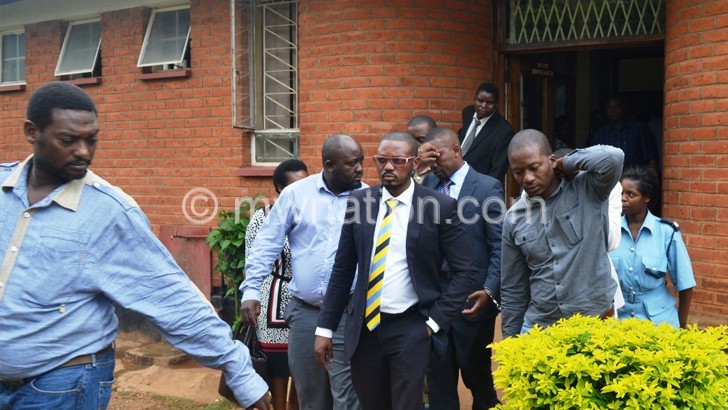Cashgate convict Seeks protection
Cashgate convict Maxwell Namata has asked the Malawi Supreme Court of Appeal for protection to be exempted from prosecution in a K2.4 billion Cashgate case involving former Ministry of Finance budget director Paul Mphwiyo and 18 other suspects.
The court has since set May 17 2017 as the date it will hear the application.
Both Namata’s lawyer Michael Goba Chipeta and Director of Public Prosecutions (DPP) Mary Kachale confirmed the development in separate interviews on Sunday.

Chipeta said the defence wants Namata’s prosecution stopped because doing so is tantamount to abuse of the court process.
He said: “Namata was prosecuted and convicted for money alleged to have been stolen from vote 360 of Ministry of Tourism and he now risks double jeopardy since he was already convicted on the same.
“The State can keep selecting offences for the same transaction instead of bringing them up all at once, the law prohibits that.”
However, the DPP said investigations indicate that the 18 people could not have managed to breach the government financial system and siphon the K2.4 billion over a period of six months without the help of an expert in information technology (IT).
In November 2015, the convict also made an appeal to the court against his conviction and sentencing by the High Court in Lilongwe. He argued that it was based on unfounded evidence.
The court is yet to make a ruling on the appeal case for conviction and sentencing.
In the Mphwiyo case, Namata and others are facing charges of fraud, negligence by public officer, money laundering and theft by public servant and conspiracy to defraud government funds amounting to K2 446 817 450.49.
Namata and his accomplice, Luke Kasamba, were handed eight and five years custodial sentences, respectively on February 16 2015 on two counts of theft and money laundering contrary to Section 35(1) (c) of Money Laundering, Proceeds of Serious Crime and Terrorist Financing Act for the amount of K24 179 120.70
Namata’s appeal is based on eight grounds which his lawyer summarised into two categories.
In the first category, the lawyer said Namata is challenging his conviction—both on theft as well as money laundering offences— while in the second category he is challenging the veracity of his sentence, arguing that it was contrary to law and manifestly excessive.
Chipeta argued that the evidence before the High Court showed that government consented in issuing the payments of the money; hence, it could not be said that the elements of the offence of theft were proved.
While making reference to an earlier Supreme Court judgement, Chipeta also argued that once the money deposited by a customer is in the bank, ownership of that money no longer belongs to the customer, but the bank.
Mphwiyo’s shooting outside the gate of his Area 43 residence in Lilongwe on the night of September 13 2013 led to revelations of the plunder of public resources at Capital Hill, widely known as Cashgate.
Former president Joyce Banda ordered a forensic audit undertaken by British firm, Baker Tilly, covering the period between April and September 2013. The audit established that about K24 billion was siphoned from public coffers through dubious payments, inflated invoices and goods or services never rendered.
In May 2015, a financial analysis report by audit and business advisory firm PricewaterhouseCoopers (PwC) also established that about K577 billion in public funds could not be reconciliated between 2009 and December 31 2014.
However, the K577 billion figure was later revised downwards to K236 billion by another British forensic auditor. n





